Mo Brooks sees impending “disaster” in new CBO budget projections

Congressman Mo Brooks (Republican- district 5) has said that the newly released 10-year budget projections by the Congressional Budget Office’s (CBO) would mean “financial and economic disaster.” In a press release, Brooks said “The Congressional Budget Office’s latest 10-year budget projection paints a bleak picture of America’s financial future.” “As the CBO report makes clear, a lack of tax revenue is not the problem,” Brooks said, “out of control Washington spending is the problem. Washington elected officials have for years spent money American does not have, has to borrow to get, and cannot afford to pay back. In Fiscal Year 2018, the federal government’s revenue was $3.329 trillion while Washington spent $4.108 trillion, leaving a deficit of $779 billion.” He continued, “America spent 23% more than it brought in. If a business or household handled their finances as poorly as the federal government, that business or household would long ago have gone bankrupt. According to CBO, revenues are up and set to increase every year through 2029, yet deficits continue to explode. Spending, not a lack of revenue, drives America’s dangerously high deficits.” Brooks concluded, “America’s current fiscal path is ‘unsustainable’ according to United States Comptroller General Gene Dodaro and the Congressional Budget Office. In accounting language, the word ‘unsustainable’ means current finances cannot last and that an American financial disaster is the end result. Stated differently, America’s budget outlook is bleak, and, absent restoration of financial responsibility, America will inevitably experience a debilitating insolvency and bankruptcy that will be triggered the moment America’s creditors decide to stop loaning American even more money that we do not have, have to borrow to get, and cannot afford to pay back. Washington’s reckless spending is the greatest generational theft in American history. It is immoral to burden our children and grandchildren with a ticking time bomb that will inevitably result in an all-out financial meltdown.” CBO Director Keith Hall agrees with Brooks that debt “is on an unsustainable course.” He suggested revenue increases and cuts to revenue programs or both in order to address the problem. The CBO also predicts that that the Federal Reserve will raise interest rates this year, CNBC reports.
Health care bill teeters, GOP adds money to woo dissidents
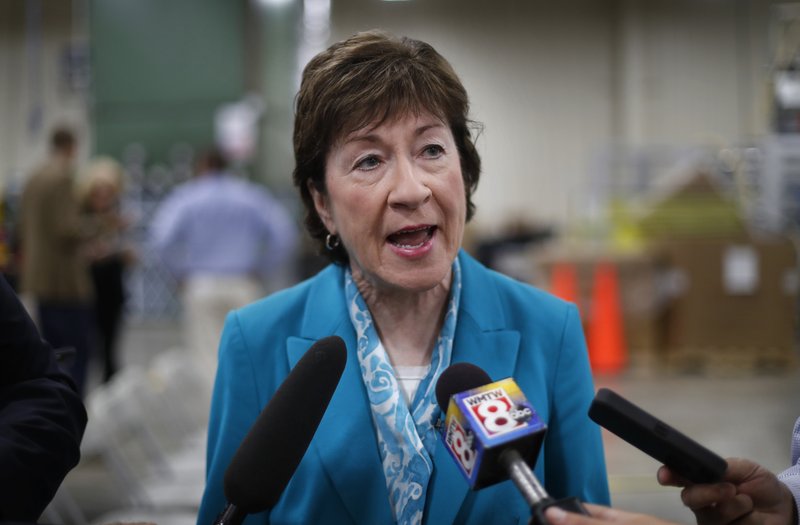
Top Republicans are adding money to their staggering effort to repeal the Obama health care law and say they’re pushing toward a climactic Senate faceoff this week. Yet their path to succeeding in their last-gasp effort has grown narrower, perhaps impossible. GOP senators’ opposition to their party’s drive to scrap President Barack Obama’s Affordable Care Act swelled to lethal numbers Sunday. Moderate Sen. Susan Collins all but closed the door on supporting the teetering bill and conservative Sen. Ted Cruz said that “right now” he doesn’t back it. President Donald Trump has pressed for a fresh vote, and White House legislative liaison Marc Short and Sen. Lindsey Graham, R-S.C., one of the measure’s sponsors, said Republicans would move toward a vote this week. Senate Majority Leader Mitch McConnell, R-Ky., has said he intends to consider the measure but hasn’t firmly committed to a vote. The Congressional Budget Office was expected to release its analysis of the legislation early this week. But the CBO, which is lawmakers’ nonpartisan fiscal analyst, has said that it doesn’t have time to determine the bill’s impact on coverage and premiums, major factors for some lawmakers deciding their votes. Instead, the office is expected to only detail its estimates of the measure’s effect on federal deficits. A vote must occur this week for Republicans to have any chance of prevailing with their narrow Senate majority. Next Sunday, protections expire against a Democratic filibuster, bill-killing delays that Republicans lack the votes to overcome. Already two GOP senators, Rand Paul of Kentucky and John McCain of Arizona, have said they oppose the legislation. All Democrats will vote against it. “No” votes from three of the 52 GOP senators would kill the party’s effort to deliver on its perennial vow to repeal “Obamacare” and would reprise the party’s politically jarring failure to accomplish that this summer. In a late stab at attracting votes, Republicans were adding $14.5 billion to the measure including extra funds for states of dissenting GOP senators, according to documents obtained late Sunday by The Associated Press. A chart Republicans circulated said the legislation’s grants would provide 14 percent more money for Arizona than under Obama’s law; 4 percent more for Kentucky; 49 percent more for Texas; 3 percent more for Alaska, home to undecided GOP Sen. Lisa Murkowski; and 43 percent more for Maine, home to Collins. Some extra money is specifically directed at sparsely populated states. The numbers are misleading, partly because they omit GOP Medicaid cuts from clamping per-person spending caps on the program, said Matt House, spokesman for Senate Minority Leader Chuck Schumer, D-N.Y. In a statement, Schumer said the measure would “throw our health insurance system into chaos.” Collins’ criticisms included the bill’s cuts in the Medicaid program for low-income people and the likelihood that it would result in many losing health coverage and paying higher premiums. “It’s very difficult for me to envision a scenario where I would end up voting for this bill,” said Collins. The conservative Cruz also voiced opposition, underscoring the bill’s problems with both ends of the GOP spectrum. “Right now, they don’t have my vote,” Cruz said at a festival in Austin, Texas. He suggested the measure doesn’t do enough to reduce premiums by allowing insurers to sell less comprehensive coverage than Obama’s law allows. Paul said even though the bill transforms federal health care dollars into block grants that states would control, the GOP bill left too much of that spending intact. McCain has complained that Republicans should have worked with Democrats in reshaping the country’s $3 trillion-a-year health care system and cited uncertainty over the bill’s impact on consumers. Murkowski has remained uncommitted, saying she’s studying the bill’s impact on Alaska. Her state’s officials released a report Friday citing “unique challenges” and deep cuts the measure would impose on the state. She and Collins were the only Republicans who voted “no” on four pivotal votes on earlier versions of the GOP legislation in July. The bill now in play would repeal much of the 2010 law, including its tax penalties on people who don’t buy insurance and on larger employers not offering coverage to workers. States could loosen coverage requirements under the law’s mandates, including prohibiting insurers from charging seriously ill people higher premiums and letting them sell policies covering fewer services. It would eliminate Obama’s expansion of Medicaid and the subsidies the law provides millions of people to reduce their premiums and out of pocket costs, substituting block grants to states. Collins was on CBS’ “Face the Nation” and CNN’s “State of the Union,” Graham appeared on ABC’s “This Week” and Paul was on NBC’s “Meet the Press,” and Short was on CBS, NBC and “Fox News Sunday.” Republished with permission from the Associated Press.
5 reasons why health care bill would fail, 3 why it may not
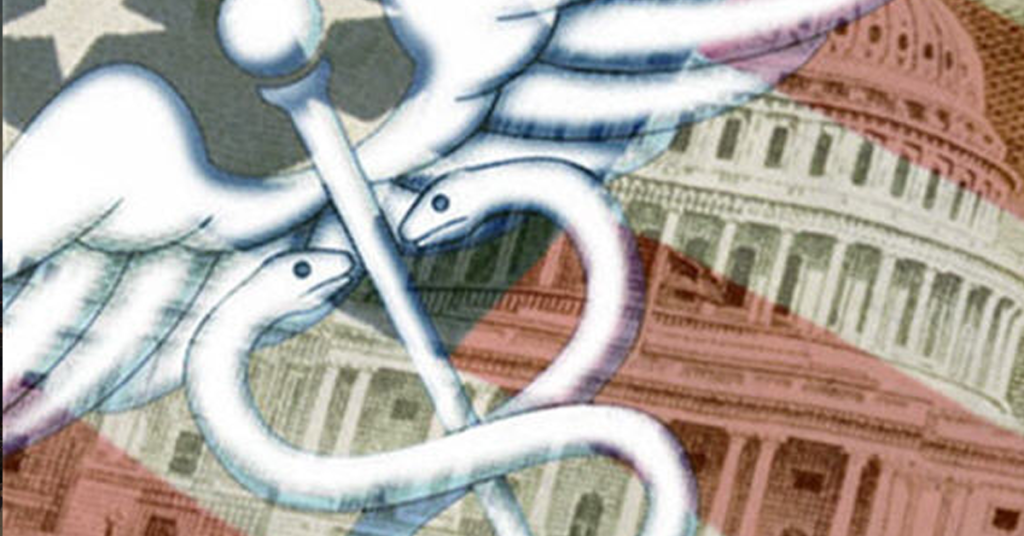
There are many reasons why the Senate will probably reject Republicans’ crowning bill razing much of former President Barack Obama‘s health care law. There are fewer why Senate Majority Leader Mitch McConnell might revive it and avert a GOP humiliation. Leaders say the Senate will vote Tuesday on their health care legislation. They’ve postponed votes twice because too many Republicans were poised to vote no. That could happen again. The latest bill by McConnell, R-Ky. – and it could change anew – would end penalties Democrat Obama’s health care law slapped on people without insurance, and on larger companies not offering coverage to workers. It would erase requirements that insurers cover specified medical services, cut the Medicaid health insurance program for the poor and shrink subsidies for many consumers. — IT FAILS: AWFUL POLL NUMBERS In an Associated Press-NORC Center for Public Affairs Research poll this month, 51 percent supported Obama’s statute while just 22 percent backed GOP legislation. Perhaps more ominously for Republicans, the AP-NORC poll found that by a 25-percentage-point margin, most think it’s the federal government’s responsibility to ensure all Americans have coverage. That’s a growing view – there was just a 5-percentage-point gap in March. It underscores a harsh reality for the GOP: It’s hard to strip benefits from voters. — AWFUL CBO NUMBERS The nonpartisan Congressional Budget Office says under McConnell’s plan, 22 million more people would be uninsured by 2026, mostly Medicaid recipients and people buying private policies. For single people, the typical deductible – out-of-pocket expenses before insurance defrays costs – would balloon that year to $13,000, up from $5,000 under Obama’s law. Note to the entire House and one-third of the Senate, which face re-election in 2018: 15 million would become uninsured next year. And though CBO says average premiums should fall in 2020, they’ll head up in 2018 and 2019. Oh, yes. The bill would let insurers charge people approaching retirement age higher prices than they can now, boosting premiums “for most older people,” CBO says. Older people like to vote. — AWFUL SENATE NUMBERS With a 52-48 GOP majority, the bill would survive if no more than two Republicans oppose it. With the indefinite absence of the cancer-stricken Sen. John McCain, R-Ariz., McConnell’s margin of error shrinks to one. At least a dozen senators have expressed opposition to the legislation or been noncommittal. Lawmakers and aides say others haven’t publicly surfaced. Moderate senators from states with vast Medicaid populations want to protect those voters. Conservatives consider it their mission to eliminate the law they’ve campaigned on abolishing for years. These aren’t easily resolved disputes. — PRESIDENTIAL DRAG President Donald Trump wants “Obamacare” repealed. He also has public approval ratings below 40 percent – Bad! – and a propensity for turning on people. Just ask House Speaker Paul Ryan, R-Wis., and Attorney General Jeff Sessions. After Ryan labored for months before the House approved its health care bill and earned a Rose Garden celebration, Trump called the measure “mean.” Trump said he wouldn’t have picked Sessions for his job had he known he’d recuse himself from investigations into Russian meddling in last year’s campaign. Some lawmakers might not be blamed for declining to carry Trump’s water. Trump expressed frustration with Republicans Sunday on Twitter. He said: “It’s very sad that Republicans, even some that were carried over the line on my back, do very little to protect their President.” While he didn’t directly say why he was upset with GOP lawmakers, Trump’s tweet came as lawmakers are struggling to reach agreement on health care. — LEMONS INTO LEMONADE The bill’s rejection would still let lawmakers cast votes showing their positions. Supporters could say they honored their repeal “Obamacare” pledges, foes could say they protected their states or adhered to conservative principles. Defeat would let the Senate refocus on tax cuts or other initiatives, though it’s unclear what major issues don’t divide Republicans. A loss means there won’t be a GOP law voters might blame for health care problems they encounter. Though Republicans may already own the issue in the public’s eye, since they run the government. — IT PASSES: THE UNTHINKABLE This isn’t happening, right? Republicans have run on repealing “Obamacare” for years. The administration won’t let the effort fail without a fight. Trump lunched with senators at the White House last week and tweeted that Republicans “MUST keep their promise to America!” On Friday, Vice President Mike Pence urged leaders of conservative, anti-abortion and business groups to pressure senators. Medicaid administrator Seema Verma has tried luring senators unhappy with Medicaid cuts, including Ohio’s Rob Portman and West Virginia’s Shelley Moore Capito, with more flexibility for governors to use Medicaid funds to help pay expenses for beneficiaries shifting to private insurance. — MCCONNELL The health bill’s floundering has tarnished McConnell’s reputation as a legislative mastermind. Many Republicans privately say if the votes were gettable, he’d have gotten them already. But the 33-year Senate veteran is wily and doesn’t want his record stained with this failure. He understands what GOP senators need and has time, and if anyone can rescue the legislation, it’s him. — TRUMP FACTOR GOP senators cross Trump at their own peril. Eight in 10 Republicans still rate him favorably. In the 2018 midterm elections, when turnout is traditionally down, those loyal voters could make a difference. Republished with permission of The Associated Press.
GOP leader says he’ll rework health bill, but offers Plan B
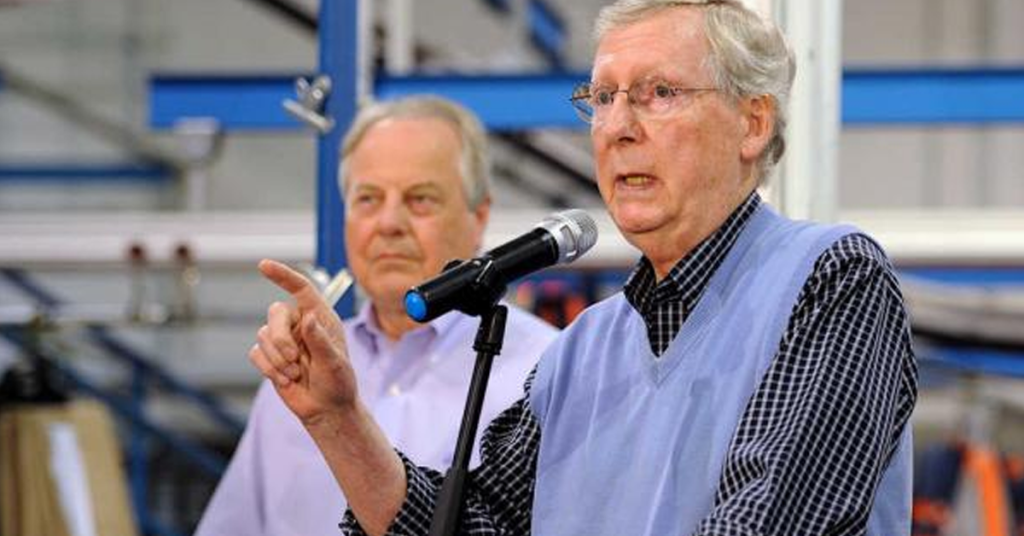
Senate Majority Leader Mitch McConnell says he plans to produce a fresh bill in about a week scuttling and replacing much of President Barack Obama‘s health care law. But he’s also acknowledging a Plan B if that effort continues to flounder. “If my side is unable to agree on an adequate replacement, then some kind of action with regard to the private health insurance market must occur,” McConnell, R-Ky., said Thursday. It was one of his most explicit concessions that a top priority for President Donald Trump and the entire GOP, erasing much of Obama’s landmark 2010 statute, might fall short. He provided no details during remarks he made at a Rotary Club lunch in a deep-red, conservative rural area of southern Kentucky. Previously, other Republicans have said that if their broad drive to dismantle much of Obama’s law struggled, a smaller bill with quick help for insurers and consumers might be needed. They’ve said it could include provisions continuing federal payments to insurers that help them contain costs for some low earners and inducements to keep healthy people buying policies – a step that helps curb premiums. McConnell’s comments suggested that to show progress on health care, Republicans controlling the White House and Congress might have to negotiate with Democrats. While the current, wide-ranging GOP health care bill has procedural protections against a Democratic Senate filibuster, a subsequent, narrower measure wouldn’t and would take 60 votes to pass. McConnell has said he wants the current bill to pass. The measure still in play would fail if just three of the 52 Republicans vote no, since all Democrats oppose it. McConnell was forced to cancel a vote on the measure last week after far more Republicans than that objected, and he’s been spending the Independence Day recess studying possible changes that might win over GOP dissidents. “We have an obligation to the American people to try and improve what we currently have. What we do know is the status quo is not sustainable,” he said. In a written statement, Senate Minority Leader Chuck Schumer, D-N.Y., called it encouraging that McConnell had “opened the door to bipartisan solutions.” He said the focus should be on continuing the federal payments to insurers, which Trump has threatened to halt. Schumer has repeatedly said Democrats won’t negotiate until Republicans abandon their repeal effort. McConnell’s comments came during a recess that has produced no visible evidence that he’s winnowed the number of unhappy Republican senators. If anything, the list seemed to have grown this week, as Sen. John Hoeven, R-N.D., said he opposed the bill, but he was vague about changes he’d want. That brought to at least a dozen the number of GOP senators who’ve publicly opposed or criticized the legislation, though many are expected to be won over by revisions McConnell is concocting. Republicans have said Obama’s law is failing, citing markets around the country where insurers have pulled out or sharply boosted premiums. Some areas are down to a single insurer. Democrats acknowledge Obama’s law needs changes that would help curb the growth of health care costs. But they say the GOP is exaggerating the problem and note that several insurers have attributed their decisions to stop selling policies in unprofitable areas, in part, to Trump administration indications that it may halt payments to insurers. A federal court has ruled the payments weren’t authorized by Congress but has allowed them to temporarily continue. In its report last week on the Senate bill, the nonpartisan Congressional Budget Office said that under Obama’s law, it expected health care markets “to be stable in most areas.” It said the same about the Senate legislation. But it also said under the GOP bill, 22 million added Americans would be uninsured because it would eliminate Obama’s tax penalty on people who don’t buy coverage and it would cut Medicaid, the health insurance program for the poor, disabled and many nursing home patients. Earlier Thursday, Sen. Ted Cruz, R-Texas, called the bill’s prospects “precarious.” On San Antonio’s KTSA Radio, Cruz said the GOP’s Senate majority “is so narrow, I don’t know if we can get it done or not.” Further qualms were voiced by Sen. Jerry Moran, R-Kan. “There are people who tell me they are better off” under Obama’s law, “and I believe them,” Moran said at a town hall meeting Thursday in Palco, Kansas. Moran, who’d previously said he doesn’t support the bill, said health care is “almost impossible to solve” with the slim GOP majority in the Senate. McConnell said he expected to have a new version of the legislation ready in “a week or so.” Another Republican, Sen. Pat Toomey of Pennsylvania, suggested it may take longer. “We’re still several weeks away from a vote, I think,” Toomey said Wednesday before a live studio audience at WHTM-TV in Harrisburg, Pennsylvania. Republished with permission of The Associated Press.
These senators will make or break the GOP’s health care push
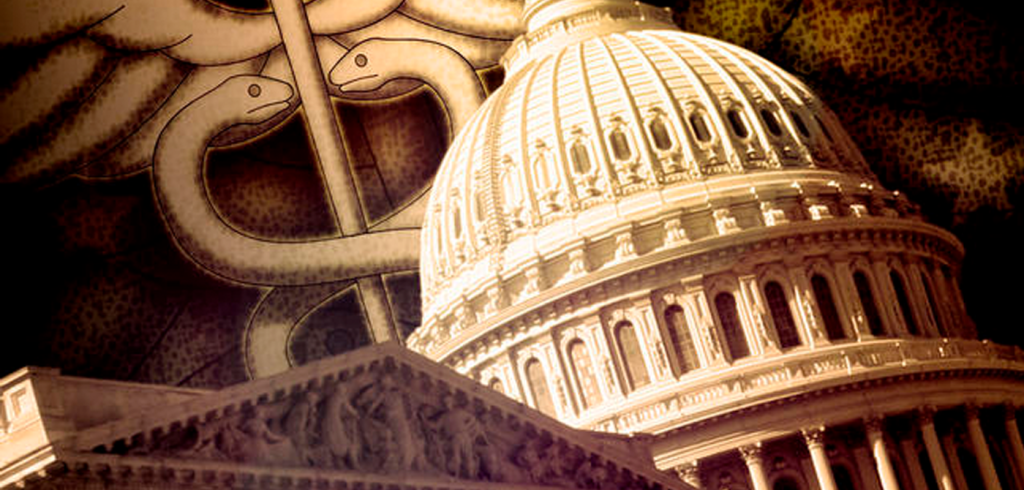
President Donald Trump‘s campaign promise to repeal and replace “Obamacare” is now in the hands of a key group of GOP senators who are opposing -or not yet supporting – legislation Senate Majority Leader Mitch McConnell is pushing to bring to a vote this week. These lawmakers range from moderate to conservative Republicans, and include senators who were just re-elected and a couple facing tough re-election fights. Their concerns about the legislation vary along with their ideology, from those who say it’s overly punitive in ejecting people from the insurance rolls, to others who say it doesn’t go far enough in dismantling former President Barack Obama‘s Affordable Care Act. Satisfying one group risks alienating another. Trump spent part of the weekend placing phone calls to a handful of these lawmakers, focusing on senators who supported his candidacy – Ron Johnson of Wisconsin, Shelley Moore Capito of West Virginia, Ted Cruz of Texas and Rand Paul of Kentucky. The next several days will show whether the president’s efforts pay off and if those lawmakers and the others will ultimately fall in line on legislation that would impact health care for millions of Americans, while allowing Trump and GOP leaders to boast of fulfilling a campaign promise seven years in the making. McConnell has scant margin for error given united Democratic opposition, and can afford to lose only two Republicans from his 52-member caucus. A look at the key Republican lawmakers: — THE CONSERVATIVES Cruz, Paul, Johnson and Sen. Mike Lee of Utah jointly announced their opposition to the legislation as written last Thursday, the same day it was released. They said it did not go far enough to dismantle “Obamacare,” and Johnson also complained of a rushed process. “They’re trying to jam this thing through,” Johnson complained Monday to conservative radio host Hugh Hewitt. Yet Johnson, like many other congressional Republicans, was elected in 2010 on pledges to repeal Obamacare and has been making that promise ever since. While looking for tweaks that can satisfy the conservatives, Senate GOP leaders are also arguing that any Republican who fails to vote for the leadership bill will be responsible for leaving Obamacare standing. Few Senate Republicans expect Paul to vote with them in the end, because of opposition he’s long expressed to government tax subsidies going to pay for private insurance, but many expect Cruz could be won over, especially since he’s running for re-election. — THE ENDANGERED Sen. Dean Heller of Nevada, the only Senate Republican up for re-election next year in a state Hillary Clinton won, surprised Senate GOP leaders by coming out hard against the health legislation at a news conference Friday. Standing next to Nevada’s popular Republican Gov. Brian Sandoval, Heller said he could not support a bill that that “takes away insurance from tens of millions of Americans and hundreds of thousands of Nevadans.” Nevada is one of the states that expanded Medicaid under the Affordable Care Act. The GOP bill would unwind that expansion and cap Medicaid payments for the future. Nevada also has a disproportionate share of older residents under age 65 – when Medicare kicks in – who would likely face higher premiums because the GOP bill gives insurance companies greater latitude to charge more to older customers. Heller’s fellow moderate Republican, Sen. Jeff Flake, faces similar issues of an aging population in neighboring Arizona. He is viewed as the second-most-endangered GOP incumbent next year after Heller. Flake has not yet taken stance on the bill but is facing a raft of television ads from AARP and other groups that are opposed. Phoenix Mayor Greg Stanton, a Democrat seen as a possible Flake challenger next year, said Monday the Senate bill “doesn’t make anyone healthier. It doesn’t make anyone safer.” But Flake, who was outspoken against Trump during last year’s campaign but has grown quieter since his election, also faces a potential primary challenge from the right. Both Heller and Flake face the uncomfortable prospect of angering their party’s base if they don’t support the GOP health bill – but alienating general election moderate and independent voters if they do. — THE MODERATES Sens. Susan Collins of Maine and Lisa Murkowski of Alaska are fellow moderates who’ve raised concerns about the Senate health bill for a variety of reasons. On Monday, after the release of a Congressional Budget Office analysis that the bill will leave 22 million more people uninsured over a decade, Collins announced she would oppose an important procedural vote on the legislation this week. Along with potential opposition from Johnson, Paul and Heller on the vote, that could leave leadership struggling to even advance to a final vote on the health care bill. Collins said that the bill’s Medicaid cuts hurt the most vulnerable and that it doesn’t fix problems for rural Maine. Murkowski has not taken a position but has also expressed concerns about the impacts on a rural, Medicaid-dependent population, as well as funding cuts to Planned Parenthood. — THE TWO-ISSUE SENATORS Sens. Rob Portman of Ohio and Shelley Moore Capito of West Virginia are generally reliable votes for GOP leadership. In this case, both have two specific, and related, concerns causing them heartburn on the health bill: The prevalence of opioid addiction in their states, and their constituents’ reliance on Medicaid. In many cases, voters with addiction problems rely on Medicaid for treatment help, and Portman and Capito both represent states that expanded Medicaid under Obama’s law. Last year about 100,000 low-income West Virginia residents with Medicaid coverage had drug abuse diagnoses, according to state health officials. Republished with permission of The Associated Press.
Promise, promises: What Donald Trump has pledged on health care

President Donald Trump is not known for plunging into the details of complex policy issues, and health care is no exception. Since his campaign days, Trump has addressed health care in broad, aspirational strokes. Nonetheless he made some clear promises along the way. Those promises come under two big headings. First, what Trump would do about the Affordable Care Act, his predecessor’s health care law, often called “Obamacare.” Second, the kind of health care system that Trump envisions for Americans. On repealing Obama’s law, Trump seems to have a realistic chance to deliver. But he’s nowhere close to fulfilling his generous promises of affordable health care for all. A look at some of the president’s major health care promises, and how the Republican legislation advancing in Congress lines up with them: REPEAL ‘OBAMACARE’ Repealing President Barack Obama‘s signature domestic achievement has been a clear and consistent promise from Trump. Under the Obama law, some 20 million people gained coverage through a combination of subsidized private insurance and a state option to expand Medicaid for low-income people. Costs have been a problem, as are shaky insurance markets for people buying their own policies. But the nation’s uninsured rate is at a historic low, about 9 percent. Both the House and Senate GOP bills would largely fulfill Trump’s promise to repeal Obama’s law. Both bills end Obama’s unpopular requirement for individuals to carry health insurance or risk fines. The legislation also phases down the Medicaid expansion and repeals hundreds of billions of dollars in taxes on upper-income people and health care industries, used under Obama to finance coverage. And it opens the way for states to seek waivers of federal health insurance requirements. Some Republican critics on the right say the congressional bills leave other major parts of “Obamacare” in place, such as subsidies for people buying private insurance, and too many rules. While the subsidy structure would remain, much less taxpayer money is invested in it. “INSURANCE FOR EVERYBODY” In a Washington Post interview before his inauguration, Trump distilled his vision for health care into a few visionary goals. “We’re going to have insurance for everybody,” he said. “There was a philosophy in some circles that if you can’t pay for it, you don’t get it. That’s not going to happen with us.” Trump said he was close to finishing a plan of his own that would have “lower numbers, much lower deductibles.” But the White House never delivered a health care plan from the president. And the congressional plans are likely to increase the number of uninsured people, because even if all Americans have access to coverage, some may no longer be able to afford it. Deductibles are likely to rise for many people with individual coverage because the congressional plans would end subsidies under Obama’s law that reduced out-of-pocket costs for those with modest incomes. The Congressional Budget Office has projected that, on average, premiums for individual policies would be lower over the long run than under current law. But there would be winners and losers. Younger adults and those in good health are likely to find better deals. Older people and those requiring comprehensive coverage could well end up paying more. TAKING AWAY THE LINES During the presidential campaign, Trump called for a system in which insurance plans would compete nationally, offering Americans choice and lower premiums. “What I’d like to see is a private system without the artificial lines around every state,” he said at one of the presidential debates. Many experts say Trump’s vision of interstate competition is unrealistic because health insurance, like real estate, reflects local prices. In any case, it remains unfulfilled in the GOP legislation. Some congressional leaders have promised that cross-state insurance will be addressed in follow-on legislation. Such a bill, however, would likely have to meet a 60-vote test in the Senate. PRESCRIPTION DRUG PRICES During the presidential campaign, and since becoming president, Trump called for action to bring down the cost of prescription drugs. The GOP bills in Congress basically sidestep that. At one point in the campaign, Trump called for giving Medicare the authority to directly negotiate prices with drug makers, an approach favored to some extent by Obama and Democratic presidential candidate Hillary Clinton. Trump also proposed letting Americans import prescription drugs from other countries, where prices are usually lower because of government regulation. But Medicare negotiations are a nonstarter for most congressional Republicans, and Trump’s call for allowing drug importation has faded. MEDICAID In a 2015 interview with The Daily Signal, Trump said: “I’m not going to cut Social Security like every other Republican and I’m not going to cut Medicare or Medicaid.” But last year, his campaign started backtracking on the Medicaid promise, endorsing the idea of limited federal financing for the federal-state program that covers some 70 million low-income people, from newborns to elderly nursing home residents, from special-needs kids to part-time workers lacking job-based health insurance. The Republican bills in Congress would phase out Obama’s financing for Medicaid expansion and limit future federal payments for the entire program as well. The Congressional Budget Office said the House bill would reduce federal Medicaid spending by $834 billion over 10 years, and the program would cover about 14 million fewer people by 2026, a 17 percent reduction. Several Republican governors have joined their Democratic counterparts calling that a massive cost-shift to the states. OPIOID CRISIS The Trump White House says it’s serious about confronting the nation’s opioid epidemic, which shows no sign of letup. “The president is all in,” health secretary Tom Price said on a recent visit to New Hampshire. “He has such passion for this issue because he knows the misery and the suffering that has occurred across this land.” But state officials say rolling back Obama’s Medicaid expansion would deal a heavy blow to their efforts to treat addiction and get its victims back to jobs and family. Among the group of low-income adults made eligible for Medicaid under Obama are many
Daniel Sutter: Just what the doctor ordered

The U.S. House of Representatives recently passed the American Health Care Act (AHCA), an expansive bill which Republicans claim delivers on their promise to repeal and replace the Affordable Care Act. The AHCA proposes changes to Medicaid that should control costs, and could even improve the quality of care for low income Americans. Medicaid is the joint state and Federal program providing health insurance for the poor and disabled. States operate the programs, with rules and over half of the funding provided by Washington. Since Medicaid’s founding in 1965, matching grants have doled out Federal dollars, with states receiving from $1 to $3 for each dollar spent (low income states get a better match). Beginning in 2020 under the AHCA, states would receive a fixed dollar amount per beneficiary, for each of five beneficiary categories. Alternatively, states could elect to receive a block grant, meaning a fixed dollar amount not dependent on the number of enrollees. Medicaid’s match has been open-ended, so that spending more on approved coverage brings in more Federal dollars. High income states have obtained more Federal dollars through generous optional coverage. But this means that for any total of Federal spending, fewer dollars are available to help poor states, compromising the quality of care. Matching grants have also produced billions of dollars of spending on services that Americans do not think are worthwhile. This last point requires some explanation. People obviously do not agree on how much we should spend on Medicaid (or any program). Labeling spending “wasteful” often simply disguises personal opinion. I think that some Medicaid spending can be more validly called wasteful. Suppose that a state considers spending $100 million on Medicaid. Given Alabama’s matching rate, our state legislators would need to appropriate about $35 million to cover $100 million of services. Is this spending worthwhile? Most Alabamians are not on Medicaid, so if we think solely in terms of personal benefit, most of us would say no. But Americans give almost $400 billion annually to charity, and so clearly consider the well-being of others. We would need to think about how much we value providing medical care for those who can’t afford it. The thinking resembles deliberating about individually donating $100 to a charity; if we give the money, we effectively say that helping others is worth at least $100. For the Medicaid example, Alabamians should consider exactly what procedures and persons will be covered, and whether we can afford the taxes. Let’s say we do this and come up with a value. If the value is at least $100 million, the spending is worthwhile. Unfortunately, Medicaid’s matching grants encourage Alabamians to only worry if the services are worth the $35 million we must spend. Yes, we pay a share of Federal taxes, but separately from decisions about Medicaid. So we might approve spending which we believe yields only $50 million in value. Spending $100 million to produce $50 million in value, I think, counts as waste. Block grants make states pay the full cost of extra spending. Consequently, Alabama and other states should only spend $100 million on Medicaid when the perceived value is at least $100 million. The Congressional Budget Office estimates that the ACHA will reduce Medicaid spending by $880 billion over a decade. Would this eviscerate Medicaid? Spending today exceeds $500 billion annually, and is projected to rise, so we will still be spending roughly half a trillion dollars a year. More importantly, the cuts should target coverage that Americans judge to not be worth the cost. No state would be compelled to cut coverage for any person currently on Medicaid. The first lesson of economics is that incentives matter. Medicaid’s open-ended matching grants create bad incentives under which states waste our tax dollars. The AHCA is a broad bill, and some elements may do more harm than good. But ending Medicaid matching grants would be a prescription for improvement. ••• Daniel Sutter is the Charles G. Koch Professor of Economics with the Manuel H. Johnson Center for Political Economy at Troy University and host of Econversations on TrojanVision. The opinions expressed in this column are the author’s and do not necessarily reflect the views of Troy University.
Poll: GOP health bill a far cry from Donald Trump promises

President Donald Trump has called the House-passed health care bill a “great plan,” but a new poll finds that 3 out of 4 people in the United States do not believe it fulfills most of his promises. The poll out Wednesday from the nonpartisan Kaiser Family Foundation also found a growing share of the public concerned that the GOP’s American Health Care Act will have negative consequences for them personally by increasing their costs, making it harder to get and keep health insurance, or reducing quality. In the poll, only 8 percent said the Senate should pass the House bill as it is. “There is nothing in this poll, that if you were in the Senate, would cause you to rush out and pass the House bill,” said Drew Altman, president of the foundation, a clearinghouse for health system information. It was the latest in an ongoing series of Kaiser surveys on health care. Senators are on break this week, back in their home states sounding out constituents. In Washington, staffers are working on a legislative framework that can get 51 votes. The House bill would eventually lead to 23 million fewer people covered, according to a recent Congressional Budget Office estimate. While it would reduce average premiums over time, it could also destabilize coverage for people with health problems in some states. The GOP measure would eliminate former President Barack Obama‘s Medicaid expansion and limit future federal financing for that safety net program. It would repeal the unpopular requirement that most people get covered or risk fines. It would continue to provide subsidies for private health insurance, but at a reduced level. And it would cut taxes on upper-income people that Democrats raised to finance their Affordable Care Act. As a candidate and as president, Trump has made reassuring promises about health care. While offering few details, he’s promised to improve coverage and cut costs. Days ago the president tweeted, “I suggest that we add more dollars to Healthcare and make it the best anywhere. ObamaCare is dead – the Republicans will do much better!” But both the House GOP bill and Trump’s own budget would make big cuts across a range of health care programs, from insurance to medical research. In the poll, 3 in 4 people said they don’t think the narrowly-passed House bill fulfills most of Trump’s promises. Thirty-five percent it fulfilled none of his promises, while 40 percent said the bill fulfills some Trump promises. Only 4 percent said the GOP bill fulfilled all of the president’s promises, while another 10 percent said it delivered on most of his promises. Drilling down to Republicans, only 30 percent said the bill delivered on all or most of Trump’s health care promises. Fifty-one percent said it fulfilled some pledges. On the plus side for Trump and his congressional allies, the poll found that the GOP base continues to support the House bill, with 67 percent of Republicans saying they view it favorably. And a plurality of Americans – 42 percent – expressed support for Medicaid work requirements favored by the GOP Other findings are not so reassuring. After Trump won, relatively few people saw personal risks from his promised repeal of Obama’s health overhaul. Only 28 percent thought it would increase the cost of their own health care, while 21 percent said it would worsen access to health insurance, and 19 percent were concerned about quality. Now, when asked about the GOP health care bill, 45 percent feared their costs would go up, 34 percent were worried about their ability to get and keep health insurance, and 34 percent were concerned that quality would suffer. The poll found that Obama’s law is more popular than the House plan. Forty-nine percent had a favorable view of Obama’s overhaul, compared with 31 percent who had a favorable view of the Republican proposal. The Kaiser poll was conducted from May 16-22 among a nationally representative random digit dial telephone sample of 1,205 adults. The margin of sampling error is plus or minus 3 percentage points for the full sample. For results based on subgroups, the margin of sampling error may be higher. Republished with permission of The Associated Press.
Health care fight shifts to Senate, where GOP wants a reboot
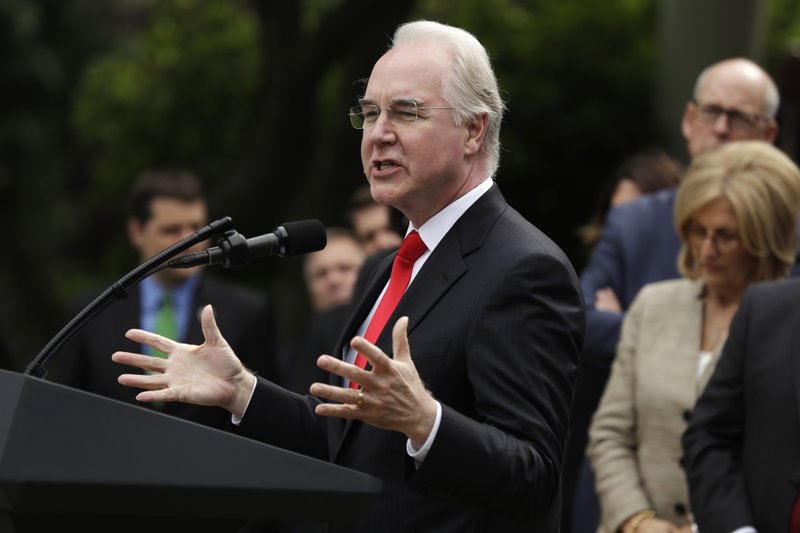
It took blood, sweat and tears for Republican leaders to finally push their health care bill through the House last week. Don’t expect the process to be less arduous in the Senate, though more of the angst in that more decorous chamber will likely be behind closed doors. No one expects a new bill to be written quickly, but Senate Majority Leader Mitch McConnell, R-Ky., has started a process for producing one. Republican senators have made clear their measure will differ markedly from the House legislation, which has drawn withering criticism from Democrats who see it as a pathway to winning a House majority in the 2018 elections. “This process will not be quick or simple or easy, but it must be done,” McConnell said Monday. MCCONNELL’S WORKING GROUP McConnell dislikes surprises and drama. Both characterized the House’s chaotic four months of work on its bill, which saw revolts by conservatives and moderates derail initial versions and humiliate President Donald Trump and Speaker Paul Ryan, R-Wis. McConnell has included himself in a group of 12 GOP senators essentially tasked with privately producing a bill that can pass the Senate. Republicans control the chamber 52-48. Democrats are virtually certain to unanimously oppose the Republican effort to repeal much of President Barack Obama’s health care overhaul. So Republicans are using a special process preventing a Democratic filibuster that would require 60 votes to end. McConnell will need 50 GOP votes to pass a bill, a tie Vice President Mike Pence could break. That means McConnell can lose just two Republicans, so his group has a strategically shaped membership. THE GROUP’S ROSTER Sens. Lamar Alexander, R-Tenn., Mike Enzi, R-Idaho, and Orrin Hatch, R-Utah, chair pivotal committees. Sens. Rob Portman, R-Ohio, and Cory Gardner, R-Colo., are from states that used Obama’s law to add hundreds of thousands of beneficiaries to Medicaid, an expansion they want to protect but the House bill would end. Gardner chairs the Senate GOP’s campaign committee. Sens. Ted Cruz, R-Texas, and Mike Lee, R-Utah, are conservative firebrands who represent states that didn’t expand Medicaid but want additional funds for that program. Sens. John Cornyn, R-Texas, John Thune, R-S.D., and John Barrasso, R-Wyo., are in the Senate GOP leadership, and Tom Cotton, R-Ark., is an ambitious up-and-comer who frequently criticizes the House measure. Democrats and liberal activists have lambasted McConnell for appointing a group with no female members. POSSIBLE CHANGES Portman is among Republicans whose states dislike the House’s Medicaid cuts because they’d face a wave of constituents losing coverage under the health care program for the poor. The House would end the extra federal money states get for new beneficiaries under Obama’s Medicaid expansion by 2020, and some GOP senators want a delay. Much Medicaid money is used to combat the illegal use of addictive opioid drugs. That’s another reason for GOP senators from hard-hit Midwestern and Northeastern states to oppose such cuts. Obama’s law helps millions buy private insurance with federal subsidies geared to income and policy premiums. The House instead links its aid to age, with older people getting larger tax credits. Thune and others want to shift the subsidies more generous to lower earners. Cruz said House conservatives won “a positive improvement” with provisions letting states get federal waivers so insurers can charge some people with pre-existing conditions higher premiums, and letting states decide which medical services insurers must cover. He said “considerably more work” was needed to lower premiums. In addition, the filibuster-free process Republicans are using requires that legislative provisions be related to raising or decreasing the federal deficit, and not primarily driven by policy changes. Conservative health care analyst James Capretta says the odds for survival “are low” for House language allowing state waivers for higher premiums on people with pre-existing conditions. Also in jeopardy: a provision forbidding consumers to use federal subsidies to buy insurance covering abortion. The Senate parliamentarian will decide whether provisions must be stricken from the bill. The Senate could override that with 60 votes. POLITICAL ERUPTION The pro-Democratic group Save Our Care is running ads in 24 districts whose GOP House members backed the bill asking, “How could you do this to us?” Obama urged lawmakers to use “courage” to protect health care for poorer Americans, a rare public comment on public policy since leaving office. Underscoring political sensitivities, critics attacked Rep. Raul Labrador, R-Idaho, for saying at a town hall meeting that “nobody dies” from lack of health care. He later said that “wasn’t very elegant.” Republicans are advertising too. The American Action Network, with links to House GOP leaders, is advertising nationally and in Ryan’s district promoting the bill. Sen. Bill Cassidy, R-La., was set to appear on ABC’s “Jimmy Kimmel Live” after saying any GOP bill must pass “the Jimmy Kimmel test.” The talk show host last week delivered a tearful monologue describing life-saving heart surgery his newborn son had received and saying lawmakers must help people afford health care. LOOKING AHEAD The nonpartisan Congressional Budget Office is expected to release its analysis of the House bill this month. It projected an earlier version would toss 24 million people off health coverage, a damaging blow that made it harder for House Republicans to pass their bill. No one is certain when the Senate might approve its bill, though some following the process think that could come by July 4. Republished with permission of The Associated Press.
Repeal in doubt, what Donald Trump alone can do on ‘Obamacare’
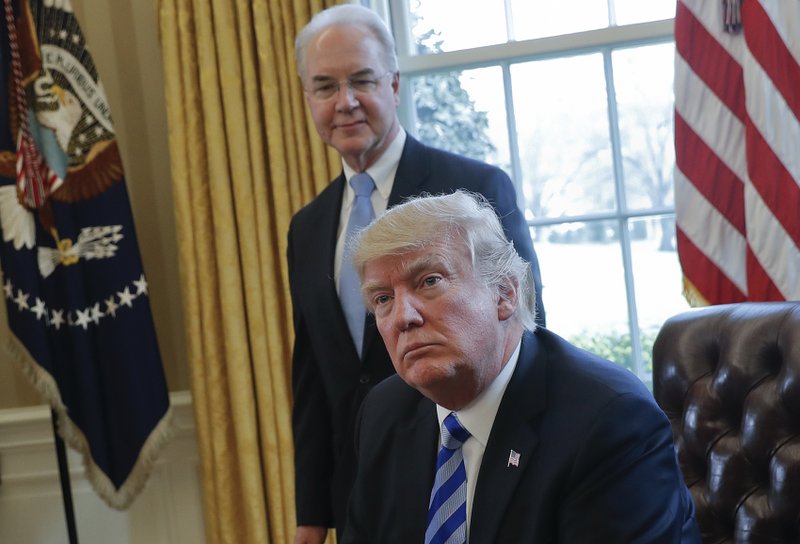
With prospects in doubt for repealing “Obamacare,” some Republicans say the Trump administration can rewrite regulations and take other actions to undo much of the health care law on its own. Some of those moves could disrupt life for millions of people, many in states that the new president carried. And then there’s the risk of court challenges. Remember the White House travel ban? “In a world where Obamacare is not going to be repealed and replaced, do you work to try to make it succeed, or do you take steps to undermine it in order to continue blaming President Obama and the Democrats for the dysfunction of the health care system?” asked Nicholas Bagley, a University of Michigan law professor who’s analyzed the administration’s leeway to make changes. “Right now we don’t know the answer, and we are getting conflicting signals from the administration.” The nonpartisan Congressional Budget Office recently concluded that insurance markets would probably be stable “in most areas” under the Obama-era Affordable Care Act, or ACA. But President Donald Trump has said “it’s imploding, and soon will explode.” GOP congressional leaders, who had to pull their repeal bill, describe a multi-pronged attack on “Obamacare” that includes administration action. Democrats warn of “sabotage.” Enduring political turmoil is seen as contributing to insurers’ worries about returning to the health law’s markets next year. Here’s a look at the pros and cons of some actions Trump could order: STOP COST-SHARING SUBSIDIES In addition to subsidized insurance premiums, the ACA provides financial assistance for deductibles and copayments to consumers with modest incomes. House Republicans have challenged the constitutionality of aid payments, estimated at $7 billion this year. A U.S. district judge in Washington agreed, finding that the law does not explicitly authorize such expenditures. The case is on hold by mutual consent of the House and the Trump administration. Insurers, who are legally obligated to provide assistance to qualifying customers, continue to be reimbursed by the government. That could end unless the legal issue is resolved. Pro: For opponents of the ACA, stopping the cost-sharing payments would be the boldest step they could take short of outright repeal. Con: Insurers would bail out or jack up premiums to make up for the loss of government payments. A market “death spiral” could begin in short order. “There’s a tension here for the White House between avoiding a crisis in the insurance markets and facilitating the collapse of a program they bitterly oppose,” said Larry Levitt of the nonpartisan Kaiser Family Foundation. Officials won’t comment on pending litigation, but there doesn’t appear to be any policy change in the new administration. ___ TWEAK INSURANCE BENEFITS The ACA requires insurers to cover ten categories of “essential health benefits,” from prevention to prescriptions, maternity to mental health. While broad categories are written into law, key specifics are spelled out in regulations and guidance. The administration could propose changes. Pro: It could bring down premiums for consumers who are comfortable buying less-than-comprehensive policies. That might entice more people into the market. “Every American ought to be able to purchase the kind of coverage that they want,” Health and Human Services Secretary Tom Price told Congress. Con: Patient advocacy groups battled for the ACA’s required benefits and they’ll fight changes seen as harmful. “Essential health benefits are critical to assure access to what most people think is basic care,” said Mara Youdelman of the National Health Law Program. “If the administration attempts to get around the four corners of the law, we would certainly explore options for litigation.” ___ REMAKE MEDICAID Alongside subsidized private insurance for people who don’t have job-based coverage, the ACA expanded Medicaid to serve millions more low-income adults. With the repeal effort stalled, some of the 19 states that have refused the expansion may come forward. That gives the Trump administration an opportunity to steer an important program in a different direction. Price and Seema Verma, Trump’s new head of Medicare and Medicaid, have told governors they are willing to consider a broad range of new Medicaid approaches, including work requirements. Verma also says she wants to improve health, not just treat disease. Pro: States may gain more authority over a program that consumes major resources. The whole country could learn from individual state experiments. More low-income people may gain coverage. Con: New requirements may discourage some from signing up. “The majority of people are working,” said Judy Solomon of the Center on Budget and Policy Priorities, which advocates for the poor. “For those who aren’t, it’s because of illness or caring for someone.” ___ WINK ON INSURANCE PENALTY Tax penalties on people who remain uninsured are the most unpopular part of the Obama-era law. The Trump administration has already eased enforcement. The IRS scrapped a plan to hold up tax returns of people who fail to indicate if they have coverage. Pro: If the tax man looks the other way altogether, it could win points for a president elected on a populist message. Some of those paying the fine are young people trying to get traction in life. Con: Policy experts say the insurance penalty is essential for nudging healthy people into the market. And it remains the law. ___ Trump’s next move is uncertain. But a recent AP-NORC poll found that 6 in 10 Americans disapproved of his handling of health care. Blaming the Obama administration may not be a viable option much longer. “If somebody can’t pay for their cancer medicine, they don’t want to hear you fulminate about how had Obamacare is,” said Bagley. Republished with permission of The Associated Press.
House sets risky health care vote after Donald Trump demands it
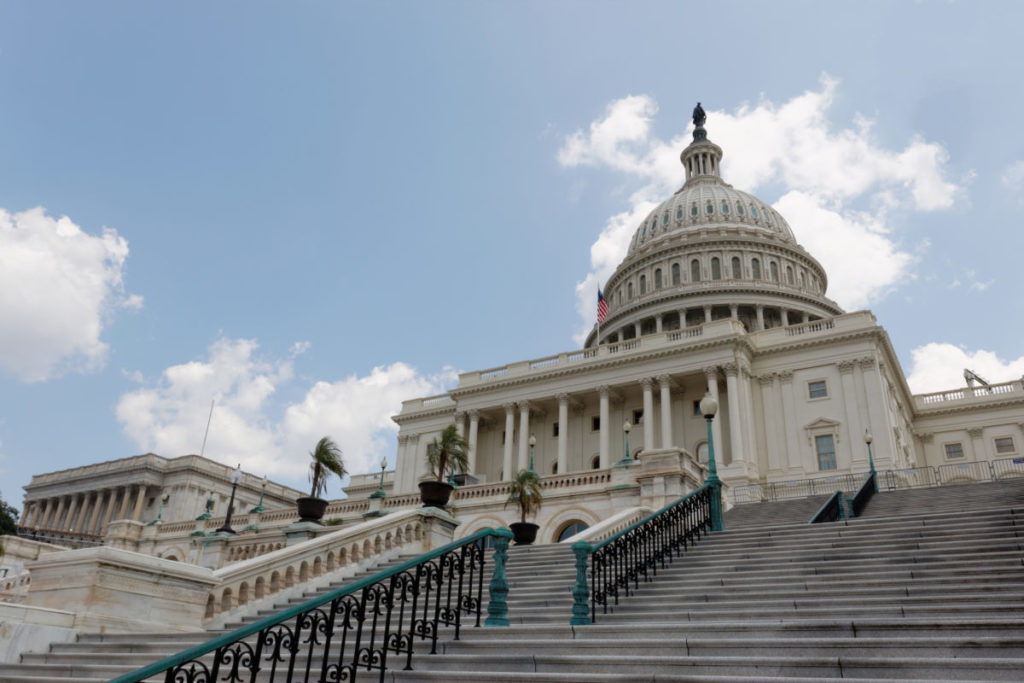
In a gamble with monumental political stakes, Republicans set course for a climactic House vote on their health care overhaul after President Donald Trump claimed he was finished negotiating with GOP holdouts and determined to pursue the rest of his agenda, win or lose. House Speaker Paul Ryan set the showdown for Friday, following a nighttime Capitol meeting at which top White House officials told GOP lawmakers that Trump had decided the time for talk was over. “We have been promising the American people that we will repeal and replace this broken law because it’s collapsing and it’s failing families. And tomorrow we’re proceeding,” Ryan tersely told reporters after scheduling what loomed as the most momentous vote to date for Trump and for the Wisconsin Republican’s own speakership. In an embarrassing and stinging setback hours earlier, leaders abruptly postponed the vote because a rebellion by conservatives and moderates would have doomed the measure. They’d hoped for a roll call Thursday, which marked the seventh anniversary of President Barack Obama‘s enactment of his landmark health care statute that Republicans have vowed ever since to annul. There was no evidence that leaders had nailed down sufficient support to prevail, nor that their decision to charge ahead was a feint and that they’d delay again if necessary. But they seemed to be calculating that at crunch time, enough dissidents would decide against sabotaging the bill, Trump’s young presidency and the House GOP leadership’s ability to set the agenda, with a single, crushing defeat. “The president has said he wants the vote tomorrow,” White House budget chief Mick Mulvaney told the lawmakers, according to Rep. Chris Collins, R-N.Y., a Trump ally. “If for any reason it goes down, we’re just going to move forward with additional parts of his agenda. This is our moment in time.” Even if they prevail, Republicans face an uphill climb in the Senate, where conservatives and moderates are also threatening to sink it. The GOP bill eliminates the Obama statute’s unpopular fines on those who do not obtain coverage and the often generous subsidies for those who purchase insurance. Instead, consumers would face a 30 percent premium penalty if they let coverage lapse. Republican tax credits would be based on age, not income. The bill would also end Obama’s Medicaid expansion and trim future federal financing for the federal-state program and let states impose work requirements on some of its 70 million beneficiaries. In a bid to coax support from conservatives, House leaders proposed a fresh amendment — to be voted on Friday — repealing Obama’s requirement that insurers cover 10 specified services like maternity and mental health care. Conservatives have demanded the removal of those and other conditions the law imposes on insurers, arguing they drive premiums skyward. Many moderates are opposed because they say the GOP bill would leave many voters uninsured. Medical associations, consumer groups and hospitals are opposed or voicing misgivings, and some Republican governors say the bill cuts Medicaid too deeply and would leave many low-income people uncovered. Republicans can lose only 22 votes in the face of united Democratic opposition. A tally by The Associated Press found at least 32 “no” votes, but the figure was subject to fluctuation amid frantic GOP lobbying. Rep. Mark Meadows, R-N.C., head of the hard-right House Freedom Caucus, said he remained a “no” but didn’t answer when asked whether the group still had enough votes to kill the legislation. He’d long said caucus opposition alone would defeat it without changes. One member of that group, Rep. Paul Gosar, R-Ariz., responded indirectly when asked if his opposition had changed. “Everybody asked us to take a moment and reflect. Well, we’ll reflect,” he said. Other foes said they’d not flipped. These included moderate Reps. Charlie Dent of Pennsylvania, Dan Donovan of New York and Leonard Lance of New Jersey, plus conservative Walter Jones of North Carolina, who had his own words of warning. “He’s there for three-and-a-half more years,” Jones said of Trump. “He better be careful. He’s got a lot of issues coming.” The nonpartisan Congressional Budget Office said changes Republican leaders had proposed before Thursday to win votes had cut the legislation’s deficit reduction by more than half, to $150 billion over the next decade. But it would still result in 24 million more uninsured people in a decade. Obama’s law increased coverage through subsidized private insurance for people who don’t have access to workplace plans, and a state option to expand Medicaid for low-income residents. More than 20 million people gained coverage since the law was passed in 2010. Many who purchase individual health insurance and make too much to qualify for the law’s tax credits have seen their premiums jump and their choices diminished. Republished with permission of The Associated Press.
Birmingham ranks 8th most Trumpcare-affected city

After seven long years of waiting to repeal President Barack Obama‘s signature health care law, Republicans released their own, the highly-anticipated alternative, proposal earlier this month. Following its release, many politicians from both sides of the aisle were none too pleased with its details. The nonpartisan Congressional Budget Office said that it would raise the average health-insurance premium for an individual policyholder by 15 to 20 percent just one or two years from now and lower federal subsidies. Thus, affecting the wallets of Americans across the country. One of the cities most affected by the new proposal? Alabama’s very own Birmingham. According to a new report of 2017’s Cities Most Affected by Trumpcare from the personal finance website WalletHub, Birmingham is the 8th most affected among the 457 U.S. cities and the fifth most affected among mid-sized cities. To gauge the impact of the Republican-proposed health plan on people who buy their own insurance, WalletHub’s analysts compared the cities based on the differences in premium subsidies that the average household would receive under Obamacare and Trumpcare. Impact of Trumpcare on Birmingham: Avg. Obamacare Premium Subsidy: $9,494 Avg. Trumpcare Premium Subsidy: $5,000 Subsidy Difference: -$4,494 *Impact measured by difference in premium tax credits received by average household under proposed and current health laws (highest difference = most affected) Other Alabama cities ranked by how affected they are by “Trumpcare”: Mobile: 23rd Montgomery: 43rd Tuscaloosa: 46th Here’s how Birmingham compares to the rest of the country: Source: WalletHub


